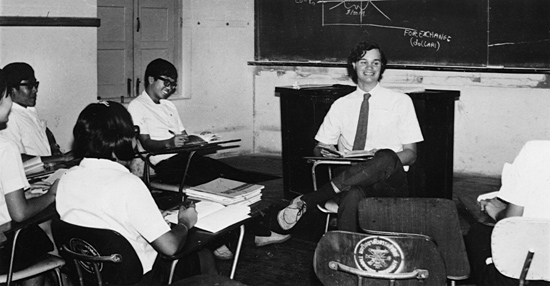-
Page Navigation Links:
- Skip to Site Navigation Links
- Skip to Features

- The University of Iowa
- Spectator
- Monthly News for UI Alumni and Friends
Scott McNabb
Associate professor, UI College of Education
Served in Thailand (1968–71)
A quick glance around Scott McNabb’s office makes it abundantly clear that the College of Education faculty member has a strong connection to Southeast Asia.
Artwork depicting Buddhist deities line the walls while colorful amulets perch on bookshelves. When asked about his time there—Thailand, specifically—McNabb’s face lights up and he seems to take a mental journey back to the country he has visited 19 times in his 40-year career.
“I figure I have spent a total of about six years there so far,” says McNabb, who first traveled to Thailand in the 1960s as a Peace Corps volunteer assigned to teach English as a member of the economics faculty at Thammasat University. “The best part of my volunteer experience was learning to understand and appreciate Thai culture: the people, their views of the world, and Buddhism. It also became a major part of my career. I use my Thailand experiences for illustrations when I talk about developing countries in my international education classes.”
Return trips have focused on research and consulting—and also seeing the friends he has made there. His connection to the Thai people prompted McNabb in 2005 to forego a month of planned sabbatical research in the country and turn his attention to relief and construction efforts following the deadly tsunami of December 2004.
“My time in Thailand has stretched me in creative ways, and that’s why I’ve gone back,” says McNabb, who grew up near Cleveland. “I think the biggest impact of the Peace Corps is on the volunteers themselves.”
This sentiment drives McNabb to participate in periodic Peace Corps informational sessions on campus and talk to interested students.
“I tell students there are very few times when you look back on life and think, ‘I wish I’d had less adventure.’ When people get engaged in other cultures, they often ‘wake up’ to the excitement and the challenge, and they thrive,” he says. “Successful cross-cultural work takes focus and determination, especially given language barriers.”
That, however, is where the Peace Corps has an advantage over similar opportunities, McNabb says. As part of the organization’s training program, he spent two summers learning to speak Thai before he left. He says he also appreciated learning how to live on a minimal income.
“We got $70 a month and had housing and health care, and that was enough,” he says. “When you serve in the Peace Corps, the cultural contrasts—and your exposure to and appreciation for other ways of viewing the world—help you become far more knowledgeable about your own culture.”
The experience, McNabb adds, also fueled his interest in a career in education.
“The dean at Thammasat gave me a great deal of flexibility,” he says. “I tried to bring different things into the classroom—activities, speakers, et cetera—to make it practical for the students, and that’s how I continue to teach.”

McNabb has visited Thailand 19 times since he first went there as a Peace Corps volunteer in the 1960s.
© The University of Iowa 2009